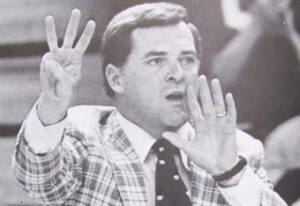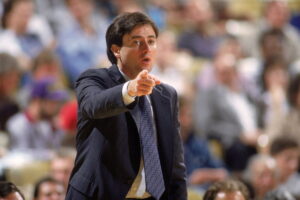by The Cowl Editor on October 4, 2020
Friar Sports
by Joseph Quirk ’23
Sports Staff
Providence College is known for many things: great academics, a friendly overall student atmosphere, and of course, its famed white-robed Dominican Friars who run the institution. Indeed, what makes Friartown so special is the pride that students have for the College, and one of the biggest sources of that school pride is PC basketball. A tradition in its own right, the men’s basketball team is a central part of life at the College, and has certainly provided PC with a fair share of memorable moments. Oct. 1, 2020 marks 100 years of PC men’s hoops, so let us take a look back at PC basketball’s storied history.
The Al McClellan Era:
Despite basketball being played for the first time at PC in 1920, the Friars’ first official varsity basketball season began in 1926. This upstart team was headed by Archie Golembeski, who at the time was also the College’s football coach. Golembeski left the following year to devote more time to football, so in came Al “The General” McClellan.
McClellan gave the program a much-needed boost in its early years: he helped lead the Friars to four New England Championships in 1929, 1930, 1932, and 1935. The Friars also finished in second place four times under McClellan. Vitally, he made the Friars one of the only New England colleges at the time willing to leave the New England area to play eastern basketball powers such as Seton Hall University, St. John’s University, Villanova University, and City College of New York.
McClellan also made the program one of only two New England schools to compete in the 1936 U.S. Olympic playoffs. Without McClellan’s willingness to push the boundaries, the PC basketball program may have died out much like Golembeski’s football program.
The Joe Mullaney Era:
A lot happened in the period between the initial success of McClellan and the hiring of Joe Mullaney. After McClellan left the team, the Friars were put into a “small school” conference, taking away their ability to play teams like St. John’s and Villanova. World War II shut the program down temporarily as well. Things started to change, however, when the sixth president of PC, Reverend Robert Joseph Slavin, O.P., recognized that the team could compete at the highest level of college basketball. A movement began to raise money to build a new gym on campus.
Then in 1955, the Friars took a gamble and hired Mullaney. Prior to joining PC, he had just one year of head coaching experience at Norwich University. Before that, Mullaney worked for the FBI. The young and unproven head coach would quickly prove the doubters wrong, as the Friars took off running under his coaching. They quickly notched a huge win over Notre Dame University, and the team climbed higher and higher from there.

In 1959, Mullaney coached the team to a quadruple-overtime win over perennial powerhouse Villanova, leading to their first National Invitational Tournament (NIT) bid. The Friars soon followed that up with an NIT championship game appearance in 1960 and then finally an NIT championship in 1961. In the 1960s the Friars were consistently a top-20 team and even had a streak of nine consecutive 20-win seasons.
In 1963, the Friars won the NIT again before reaching the Elite Eight of the NCAA tournament for the first time ever in 1965. They came into the tournament as the No. 4 team in the country. Jimmy Walker, one of Mullaney’s recruits and the leader of these mid-60s Friars, became PC’s first 2000-point scorer ever. Walker led the nation in scoring in 1967 and was soon drafted with the first pick in the NBA draft by the Detroit Pistons.
Mullaney spent 14 years with the Friars, leading them to a 271-94 record (.742) and two NIT championships. The only schools to post higher win percentages than Mullaney’s Friars in the 1960s were the University of California, Los Angeles and the University of Kentucky. Mullaney would leave the Friars in 1969, riding his Friartown success to the head coaching job for the Los Angeles Lakers.
The Dave Gavitt Era:
Dave Gavitt was an assistant on Joe Mullaney’s staff in the early ’60s before moving on to coach at Dartmouth College. After Mullaney’s departure to Los Angeles, Gavitt was hired back as his replacement, which ensured PC’s continued success. Gavitt, much like his predecessor, led the Friars to eight consecutive 20-win seasons and posted a 209-84 (.713) record. His teams featured six All-Americans, as well as a Sweet Sixteen appearance and a Final Four appearance during his 10-year tenure as coach of the Friars.
However, perhaps his biggest contribution to the program was directing national attention toward PC basketball. Gavitt recognized that the 3000-seat arena in Alumni Hall was too small for the Friars if they wanted to become a perennial competitor on the national stage. So, he negotiated a deal to play in the Providence Civic Center (renamed the Dunkin’ Donuts Center in 2001), which allowed the team to play big-time opponents in front of sellout crowds.

In 1976, Gavitt and PC set up their own holiday tournament, the InBank Classic, where they upset the University of Michigan in double overtime. In 1979, Gavitt stepped down as the coach of PC to become the first commissioner of the newly founded Big East Conference, in addition to his responsibilities as the College’s athletic director.
The 1987 Final Four:
PC was in a lull. Coach Gavitt had left the team right when its competition became tougher, as the creation of the Big East meant more games against teams such as Villanova, St. John’s, and Seton Hall. It also meant PC’s schedule was now filled with other basketball powerhouses from other big conferences such as the Atlantic Coast Conference and the Big 10.
With this major increase in competition, it became clear that the Friars lacked the talent to contend with the best teams. That is, until they hired Rick Pitino, an assistant coach from the New York Knicks. Pitino would field a winning team in his first season as coach before completely revamping the team in 1987. Led by point guard Billy Donovan, a future head coach himself, Pitino’s Friars roared to a 25-9 record and their first top-20 appearance in years.

The team would dance all the way to their second Final Four ever. Although they lost to Syracuse University, the Friars were back on the map. Unfortunately, 1987 would be Pitino’s second and final season at PC, as he accepted an offer to return to New York to become the Knicks’ head coach.
The Ed Cooley Era:
After the Final Four run with Pitino in 1987, the Friars continued to have success, but to a lesser extent. The late 2000s featured a major lull in PC basketball history. However, the 2011 hiring of Providence, Rhode Island native Ed Cooley changed that.

Cooley has led Providence to some very successful seasons in recent years. This includes the College’s second-ever Big East title in 2014 and a string of five consecutive NCAA tournament appearances. He also led the team to big upset victories such as a win over third-ranked Villanova in 2018 and a historic run of consecutive wins against top-25 opponents in the 2019-2020 season. Additionally, Cooley produced top NBA talent such as Kris Dunn, and he continues to make the Friars a force in the Big East.
Cooley is now looking to build on the Friars’ 100 years of success as the team enters its second century of play.